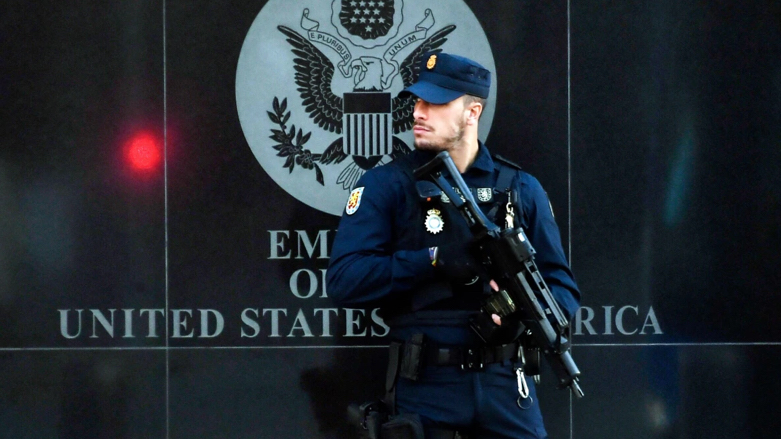Letter bombs, bloody packages sent to Ukrainian sites, US embassy

WASHINGTON DC, United States (Kurdistan24) - Late last week, the US State Department confirmed that its embassy in Spain had been targeted with a letter bomb, apparently linked to the war in Ukraine.
The confirmation came, as it was revealed that a campaign of harassment and intimidation by items sent through the mail had begun in Spain as early as Nov. 24.
Suspicion immediately fell on Russia, and Ukraine was quick to suggest that Russia, indeed, was responsible, although Moscow denounced the bombings as “totally condemnable” and denied responsibility.
Spanish authorities have refrained from speculating on which party might have been responsible, although they did say on Saturday that the explosive items were sent from the northwestern city of Valladolid, capital of Spain’s autonomous region of Castile and Leon.
Campaign Began with Small Bombs Sent through Mail
Six small bombs were sent between Nov. 24 and Dec. 1. The campaign began with an explosive package addressed to the Spanish Prime Minister Pedro Sanchez, of Spain’s Socialist Workers’ Party.
On Nov. 30 two more letter bombs were received, one by the Ukrainian embassy in Madrid. It was addressed to the Ukrainian ambassador and caused minor injuries to an embassy security official, after it burst into flames.
Ukraine’s ambassador gave the most detailed account of those bombs. He explained that the package had looked suspicious to his secretary, because it had no return address and “did not look like a typical diplomatic post,” the Associated Press reported.
“The package contained a box,” he said, and his secretary summoned a security guard. He took it outside to open, careful that no one else was around. After opening it, he heard a click, tossed it and then heard the explosion.”
The third letter bomb was received by the Spanish arms manufacturer, Instalaza, located in Spain’s northeast.
Instalaza has sent over 1,000 C-90 rocket launchers to Ukraine for use in its war with Russia. While Spain has supported Ukraine against Russia, its support has not exceeded what other European countries have done, and it is unclear why it should be targeted.
Nonetheless, on Dec 1, the US embassy in Madrid also received a bomb, as did Spain’s Defense Ministry. A sixth bomb was sent to the director of the European Union Satellite Center, an EU geospatial intelligence body, whose work includes monitoring the situation Ukraine.
“Bloody Packages” Follow
The following day, on Dec. 2, Ukraine reported that nearly a dozen of its diplomatic missions in Europe had received “bloody packages” that day. The packages contained animal tissues, particularly the eyes of various animals, including cows, fish, and pigs.
The packages were “soaked in a liquid of a characteristic color and had a corresponding smell,” a Ukrainian Foreign Ministry spokesman explained.
He also listed the sites which had received the packages: Ukraine’s embassies in Austria, Croatia, the Czech Republic, Hungary, Italy, the Netherlands, and Spain, as well as consulates in the Czech Republic, Italy, and Poland.
Like the letter bombs, the bloody packages were sent from Spain.
Speaking to CNN later that day, Ukraine’s Foreign Minister, Dmytro Kuleba, denounced the packages as an orchestrated campaign. Asked who he thought was behind them, he suggested Russia or someone “who sympathizes [with] the Russian cause and tries to spread fear.”
Kuleba noted that although the campaign had begun with an explosion at Ukraine’s embassy in Madrid, what followed “was more weird and I would even say sick.”
The Ukraine Foreign Ministry sees the packages as part of an effort to intimidate its diplomatic staff.
